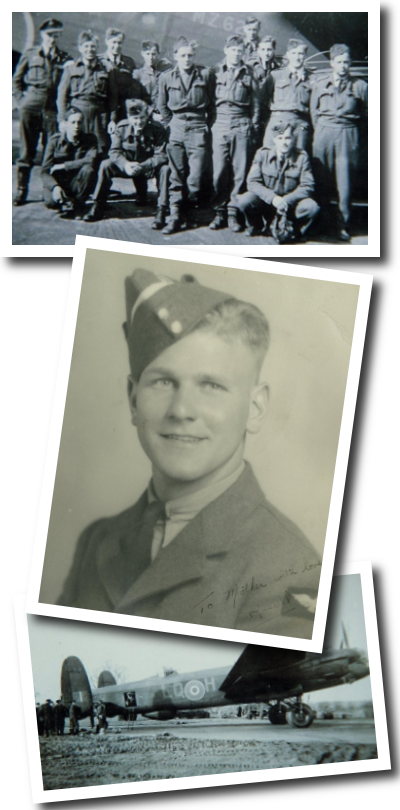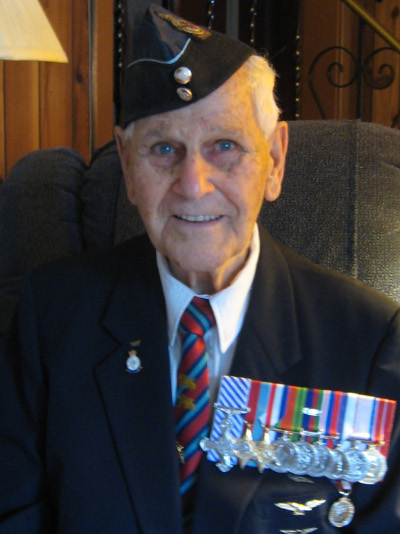
These are stories of the World War II experiences of Flying Officer Russell Frederick Hubley, now lieutenant Colonel Russell Hubley, DFC, CD, retired, my father. While growing up, my sister and brothers, and myself, were often regaled with these stories, usually humorous, but always fascinating. For years now family and friends have been urging me to commit these stories to a book before they are lost. The problem has never been a lack of interest on my part, but it has entailed a great deal of prodding to convince him to sit down and fill me in with all the details.
I have compiled these stories from hours of recorded conversations and pages of his notes as well as excerpts from his original logbook during his Air Force career. To provide additional information, many details are supplemented by historical and technical references. The journal is written primarily in the first-person singular, present tense, as this is how the stories were told to me and this form seemed simplest. The account spans the period from Russ’s enlistment in the RCAF to his discharge in 1945 with a brief account of events to the point of this writing in 2013.
This book is available in hardcopy and e-book. Purchase online at: book locker, amazon.com, amazon.ca, chapters or Haligonians may order an autographed copy directly from the author at 225-3214 or readers@brucehubley.ca

These accounts are the real life WWII experiences of RCAF Flying Officer Russell Hubley. From his enlistment to discharge this biography covers his training and details of the many operations which made up more than two full tours. Sixty trips in a war where only one in four aircrews survived even one tour. Told in his own words, in a style meant to show the humour in the daily lives of the aircrews of Bomber Command, it answers such questions as "What is the best way to clean your wedge cap without burning down the barracks?' and 'How did the USAF manage to provide ice-cream to its personal without the need of freezers?'
One of the first D-Day veterans while flying with 431 Iroquois Squadron, FO Hubley and his crew dropped their bombs inside one hour after the official opening of the invasion. Most of his enlistment was spent in 405 Vancouver Squadron, Canada's only Pathfinder squadron flying with the RAF. These stories of now Lt. Col. Hubley DFC, CD (retired) have been compiled and recorded by his son. As one of the few surviving WWII veterans his tale needed telling before it was lost.
Russell Hubley was born in Halifax, Nova Scotia on the 19th day of December 1921. His father was Russell Warren Hubley born in Seabright, Halifax County, Nova Scotia, on the 19th day of September 1895 and his mother was Esther Mildred Brogan of Chipman, New Brunswick, born on the 7th day of September 1900. He grew up in Halifax and lived here until his enlistment in the RCAF.
At the time of this writing he has four children, eight grandchildren and several great-grandchildren whose numbers are growing.
Be aware that this is not a history book. There are many fine accounts written about this traumatic period in the human experience. It is instead an account of the experiences of one man who lived the times and survived to relate them to us. Flying officer Hubley and his crew served in 405 Squadron, Canada's only elite Pathfinder squadron flying with the RAF. Pathfinders were tasked with marking the targets for the primary force and often flew ahead of the main gaggle of bombers. It was a dangerous occupation and in a squadron where your life expectancy was about five operations, this crew survived two full tours, a total of 71 trips. My father always claims that he actually had six trips into his third tour as these two excerpts will explain:
"On the 19th we take off on our last operation to raid the Ruhr Valley industrial zone at Witten. As you may imagine, in this well defended area, we are on high alert and extremely diligent in watching for fighters and flak from the anti-aircraft batteries. The target is railroad yards and a steel works in the area of Witten and I remember seeing many large explosions. There are one thousand and eighty-one tons of bombs dropped destroying sixty-two percent of the built-up area. Three hundred and twenty-four aircraft take part with the loss of one Mosquito, six Halifaxes, and one Lancaster.
We are anxious to complete this trip as we are under the impression that this is our last operation, and our return to base will mark the completion of operational flying. However, one of the beautiful ladies, be it Luck or Fate, decided to interfere with our well laid plans by throwing us the first of two curveballs.
When we arrive at base, delighting in the thought that we have safely completed our second tour, the Squadron Leader is waiting in the dispersal area as we climb from the plane. He requests we gather around as he has an important message and wishes to speak to the whole crew as one. We are a jovial lot expecting congratulations on completion of operational flying and soon going home. What he has to tell us is that shortly after we had taken off, and about the time we were crossing the English Channel, a message arrived from London Headquarters advising that we had to do six more trips to complete our second tour. There is no way that anyone not having undergone our experiences of the last years could understand how we felt about this news. However, we had no choice but to carry on to complete our second tour, it was, after all, the Air Force, and you follow orders without complaint. At least without complaints uttered within the hearing range of anyone with authority. And so, disappointed, but still maintaining a sense of duty, we return to the air the next evening for a raid on Hemmingstedt, ...
... Finally, on the eighth day of April 1945, we are assigned the last of our extra six trips. This raid involves more than four hundred aircraft over Hamburg and causes much damage in the area including the shipyard. The RAF loses six aircraft during this operation.
Now it was time for that beautiful lady to throw her second curveball and, to our not complete surprise, the same officer greets us upon our return from this final operation. Once again he asks that we gather around as he has something to say. He starts off by saying that he has good and bad news. You can probably imagine what we expect and so we ask for the good news first. He proceeds with congratulations on completing our second tour and informs us that he has arranged a fine meal and drinks at the mess. Hearing this we figure facing the bad news will be 'a piece of cake' and ask that he tell us. He advises that after we left on this trip, and as we were crossing the coast of France, another message had been received from London headquarters stating that we did not have to do the six extra trips. That is Air Force logic, and it leaves a lot to be desired, and it certainly deserves to label S.N.A.F.U. - Situation Normal, All Fowled Up."